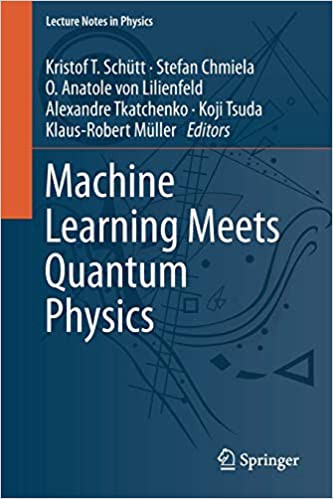Despite there are quite some excellent books on quantum computing, specific textbooks on quantum machine learning are still missing.

The only one I feel confident to recommend is “Machine Learning Meets Quantum Physics” edited by Springer by Kristof T. Schütt, Stefan Chmiela, O. Anatole von Lilienfeld, Alexandre Tkatchenko, Koji Tsuda, Klaus-Robert Müller as Editors. It is a collection of research papers (so, not for beginners), which are mostly focused on chemical quantum simulation capitalizing some machine learning tools.
“Quantum Machine Learning: What Quantum Computing Means to Data Mining” edited by Elsevier. It is a text written by Peter Wittek (which we mentioned before about his video course on quantum machine learning). This is a text which is introducing you both to quantum computing and machine learning. It is a good move if you do not know them both. However, I would generally discourage a text which is trying to accomplish everything (and in the end for obvious reasons remain introductive). Indeed, the applications on quantum machine learning are really vaguely mentioned. I was a bit disappointed considering who is the author, but I guess this was his intention, and if you are a total newbie in both fields, why not?
Quantum Machine Learning with Python by Santanu Pattanayak edited by Apress.
More recent compared to the other 2 and definitely on the practical side of the spectrum. Recommended for computer scientists who want to go straight to the point.
As the title says, it is mostly focused on coding. It starts with some introduction to quantum computing, quantum Fourier transform and towards the end quantum neural networks and quantum Tensorflow and PyTorch. There are several pseudo code transcripts and some guided scripts in Cirq and Qiskit as the title says. You can sneak on the explained code on the related Github repo:
If you need an overview of practical texts about quantum computing check
Quantum computing and machine learning are among the buzz words of our days, partially for true reasons and partially for hype. There might be some advantages in combining them, but it is yet to be demonstrated that those gains are just slight increments. On the other end, quantum computing is still in its infancy and in the future will be more ubiquitous. Therefore, I would expect we will have machine learning algorithms that run on optic hardwares. Quantum machine learning is not going to be the next revolution, but rather a normal way of designing algorithms as quantum computing will be more common.
